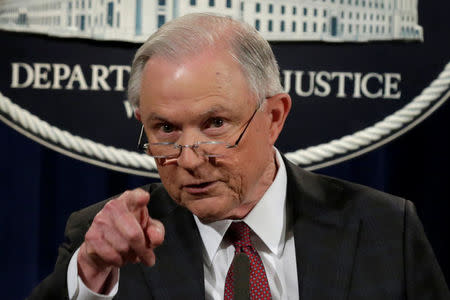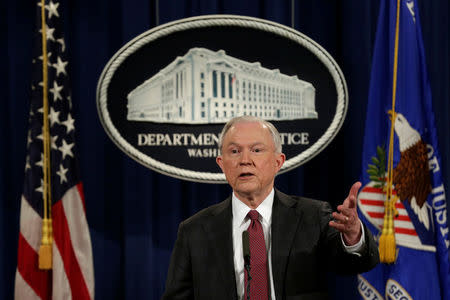Democratic senator calls on Sessions to testify over Russia contacts
By Susan Heavey
WASHINGTON (Reuters) - A Democratic lawmaker on Friday called for U.S. Attorney General Jeff Sessions to be questioned by the Senate Judiciary Committee over his failure to disclose meetings with Russia's ambassador during last year's presidential campaign.
Senator Richard Blumenthal made the demand a day after Sessions, the country's top justice official and a key ally of Republican President Donald Trump, removed himself from an investigation into alleged Russian meddling in the election.
"He certainly made a seemingly false statement," Blumenthal, who sits on the judiciary committee, told MSNBC, referring to Sessions' denial during his Senate confirmation hearing that he had any contact with Russian officials during the campaign.
Republicans, who control Congress, are unlikely to support any move to put Sessions under the microscope of Democrats, many of whom are pressing for his resignation and a broad probe of ties between Trump campaign associates and Russian operatives.
Sessions, a former senator from Alabama, said on Thursday he met Russian Ambassador Sergei Kislyak in his Senate office two months before the election as well as at an event with other ambassadors at the Republican National Convention.
Related Video:
For more news videos visit Yahoo View, available now on iOS and Android.
The Washington Post first disclosed the meetings on Wednesday.
"I'd like him to explain what was said during that Sept. 8th meeting. Remember, it was at the height of the campaign season during a time of widespread reports of Russian interference in our election, and possible complicity and connection between the Trump campaign and the Russians," Blumenthal said.
Sessions told reporters he had done nothing wrong by failing to disclose the contact with Kislyak.
Trump has backed his attorney general and accused Democrats of blowing the issue out of proportion for political purposes.
On Friday, he accused Chuck Schumer, the top Democrat in the Senate, of double standards for having met Russian President Vladimir Putin himself.
"We should start an immediate investigation into @SenSchumer and his ties to Russia and Putin. A total hypocrite!" Trump said in a tweet that included what appeared to be an old picture of Schumer and Putin smiling as they ate donuts.
Schumer, who has called for Sessions' resignation, responded in a tweet that he was willing to swear under oath that his contact with Putin and the Russian leader's associates occurred in 2003 and in public with the media present. 'WITCH HUNT'
Two U.S. officials, speaking on condition of anonymity on Thursday, said Sessions was one of many subjects of a government investigation of any contacts between the Trump campaign and Russia.
While there is nothing legally wrong with such meetings, the reported contacts raise questions about the White House's statements that it knew of no further contacts with Russian officials beyond those by ex-national security advisor Michael Flynn, who was fired last month.
The Russian controversy has dogged the early days of the Trump administration and threatens to obscure its push to cut taxes, repeal the Obamacare healthcare law and deal with other top domestic priorities.
U.S. Senator Angus King, an independent who caucuses with the Democrats, told MSNBC he also favored another committee hearing with Sessions.
U.S. intelligence agencies concluded last year that Russia hacked and leaked Democratic emails during the election campaign as part of an effort to tilt the vote in Trump's favor. The Kremlin has denied the allegations.
On Friday, Russian Foreign Minister Sergei Lavrov said the controversy looked like "a witch hunt," the RIA news agency reported.
Trump called frequently during his campaign for improved relations with Russia, which have been deeply strained in recent years over Moscow's military interference in Ukraine, its support for President Bashar al-Assad in Syria and Putin's intolerance of political dissent.
With his administration on the defensive over Russia, Trump's enthusiasm seems to have cooled, and his top foreign policy advisers have begun talking tougher about Moscow. (Writing by Paul Simao; Editing by Alistair Bell)


